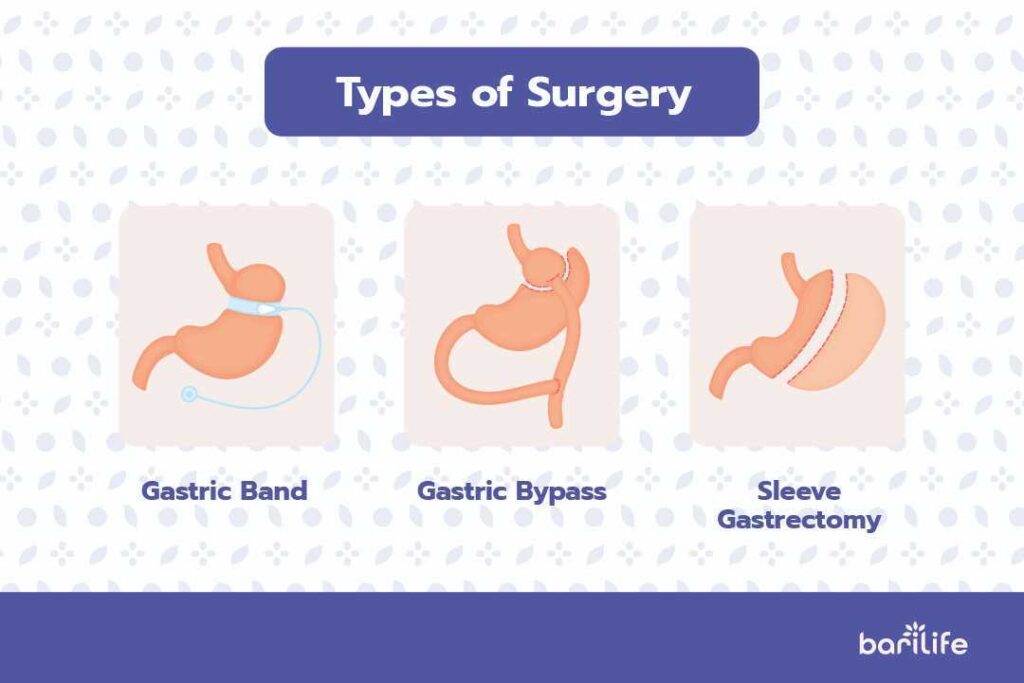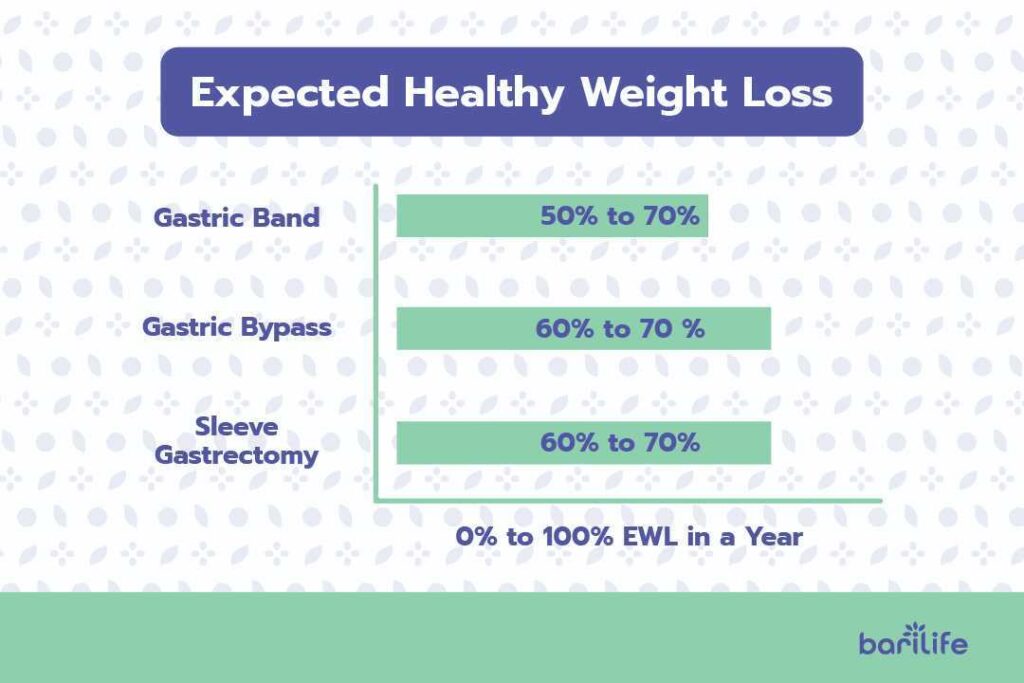This calculator will estimate how much of your Excess Weight Loss (EWL) you can expect with each bariatric surgery option.
This is a good first step in evaluating your bariatric surgery options, or benchmarking your personal weight loss progress against the average.
This article delves into three various bariatric procedures, offering insights into the different types available to those seeking a healthier lifestyle. From gastric bypass to sleeve gastrectomy, each surgical approach carries its unique benefits and considerations.
We’ll explore the concept of a weight loss calculator tailored to specific bariatric surgeries, providing individuals with personalized insights into the potential outcomes of their weight loss journey. If you want to know more, be sure to subscribe.
Types of Bariatric Surgery
There are three common types of bariatric surgery: gastric bypass, sleeve gastrectomy, and the gastric band. Choosing the most suitable type of bariatric surgery depends on factors such as the patient’s overall health, body mass index (BMI), and individual preferences. It’s crucial for individuals considering bariatric surgery to consult with a healthcare professional to determine the most appropriate option for their specific circumstances.

Gastric Bypass
In gastric bypass, also known as a Roux-en-Y, a small pouch is created at the top of the stomach, limiting the amount of food it can hold. The small intestine is then rearranged to connect to this pouch, reducing the absorption of calories and nutrients.This surgery both restricts food intake and alters the digestion process, leading to significant weight loss. Gastric bypass often results in substantial weight loss, and it can also have positive effects on conditions like type 2 diabetes.
Sleeve Gastrectomy
Sleeve gastrectomy involves the removal of a large portion of the stomach, leaving a smaller, banana-shaped “sleeve.” This reduces the stomach’s capacity and limits the production of the hunger hormone ghrelin. The surgery primarily restricts the amount of food that can be consumed and reduces feelings of hunger, contributing to weight loss. Sleeve gastrectomy is effective in promoting weight loss and improving conditions associated with obesity, such as diabetes and high blood pressure.
Duodenal Switch
A duodenal switch, also known as a biliopancreatic diversion with duodenal switch (BPD-DS), is a complex type of bariatric surgery designed to promote weight loss in individuals with severe obesity. The procedure involves two main components: restrictive and malabsorptive. First, a significant portion of the stomach is removed, limiting the amount of food a person can consume. Additionally, the surgery reroutes the small intestine, causing a significant portion of it to be bypassed. This malabsorptive element restricts the absorption of nutrients and calories from the food that is consumed. The combination of these two components makes the duodenal switch an effective procedure for achieving substantial and sustained weight loss.
Regardless of which type of bariatric surgery you pursue, you’ll want to make sure you read our Ultimate Guide to Pre-Bariatric Surgery before embarking on this journey.
What Can You Expect In Terms of Healthy Weight Loss
It’s important to note that the following numbers are averages, and individual outcomes can vary. Moreover, sustained and successful weight loss often requires a commitment to lifestyle changes, including adopting a healthier diet, regular exercise, and ongoing medical follow-ups.
Gastric Bypass
In the first year after surgery, patients may lose a substantial amount of weight, often ranging from 50% to 70% of their excess body weight. Beyond the first year, weight loss tends to continue, although at a slower rate.
Sleeve Gastrectomy
While individual results can vary, many people may experience weight loss of 60% to 70% of their excess body weight within the first year following surgery. The initial phase of weight loss tends to be more rapid in the first few months, gradually stabilizing over time.
Sleeve Gastrectomy
While individual results can vary, many people may experience weight loss of 60% to 70% of their excess body weight within the first year following surgery. The initial phase of weight loss tends to be more rapid in the first few months, gradually stabilizing over time.
Duodenal Switch
On average, individuals may lose 60-70% or more of their excess weight within the first year following surgery. Over the long term, patients can often maintain a substantial portion of this weight loss.

Five Factors that Affect Weight Loss After Surgery
Weight loss after bariatric surgery is influenced by various factors, and individual outcomes can vary. It is crucial to keep in mind that although undergoing the surgery significantly increases the chances of successful weight loss, the possibility of weight gain remains if behavioral changes are not implemented. Here are some key factors that can affect weight loss after bariatric surgery.
Adherence to Diet
Bariatric surgery often involves reducing the size of the stomach or altering the digestive tract, which can impact nutrient absorption. Following a prescribed diet ensures that patients receive the necessary nutrients in appropriate amounts to prevent deficiencies and support overall health.
Portion control is crucial to avoid overeating, maximize nutrient absorption, and facilitate weight loss. Certain foods, particularly those high in calories and low in nutritional value, can impede weight loss progress. It’s important to maintain healthy eating habits including choosing nutrient-dense foods, focusing on lean proteins, incorporating fruits and vegetables, and limiting processed and high-calorie snacks.
Physical Activity
Regular physical activity contributes to weight loss and overall well-being. It does this by helping burn calories, contributing to a negative energy balance that promotes weight loss. Physical activity also enhances the body’s ability to utilize stored fat for energy, aiding in the reduction of excess body weight.
Exercise can boost the metabolic rate, even during periods of rest. This increase in metabolic activity supports ongoing calorie expenditure, making it easier for individuals to maintain weight loss over time. However, it’s important to start gradually and follow the surgeon’s recommendations.
Lifestyle Changes
Combining stress management and prioritizing sleep with dietary changes and regular exercise creates a holistic and sustainable approach to weight loss after bariatric surgery.
Stress often leads to emotional eating, where individuals use food as a coping mechanism.
Adopting stress management techniques such as mindfulness, deep breathing, meditation, or yoga can help patients develop healthier coping mechanisms. These practices enhance self-awareness and empower individuals to make mindful food choices.
Additionally, inadequate sleep disrupts hormonal balance, leading to an increase in ghrelin (hunger hormone) and a decrease in leptin (satiety hormone). This hormonal imbalance can result in heightened cravings and overeating.
Support System
Bariatric surgery is a life-changing experience that can bring about various emotions, including excitement, anxiety, and sometimes even stress.
Having a support system, comprising friends, family, or support groups, provides emotional reassurance during the post-surgery period. Knowing that others are aware of the weight loss goals creates a sense of accountability.
A supportive network encourages individuals to adhere to the necessary lifestyle changes as well as acknowledges achievements, fostering a positive environment that boosts confidence and reinforces the commitment to long-term success.
Supplemental Nutrition
The procedures involved, such as gastric bypass or sleeve gastrectomy, often lead to reduced food intake and altered nutrient absorption. As a result, patients may face challenges in meeting their nutritional needs through regular dietary intake alone.
Protein is a critical component for maintaining muscle mass and promoting healing after surgery. Supplemental protein shakes or powders may be recommended to help patients achieve their protein goals.
Bariatric surgery can lead to deficiencies in vitamins and minerals, such as vitamin B12, iron, calcium, and vitamin D. Supplements are often prescribed to prevent deficiencies and associated complications like anemia or bone issues.
Why not grab our best-selling Just One Multivitamin with all the 23 Vitamin and Minerals you need to recover and stay healthy after bariatric surgery
Summary
It is crucial to recognize that choosing bariatric surgery is a significant decision, and consultation with healthcare professionals is paramount. By understanding the diverse array of surgical options and leveraging the insights provided by weight loss calculators, individuals can embark on a journey towards sustainable and transformative weight loss, fostering a healthier and more fulfilling life.
Regardless of which type of bariatric surgery you pursue, you’ll want to make sure you read our Ultimate Guide to Pre-Bariatric Surgery before embarking on this journey.





What are your tips and tricks to post-bariatric success?